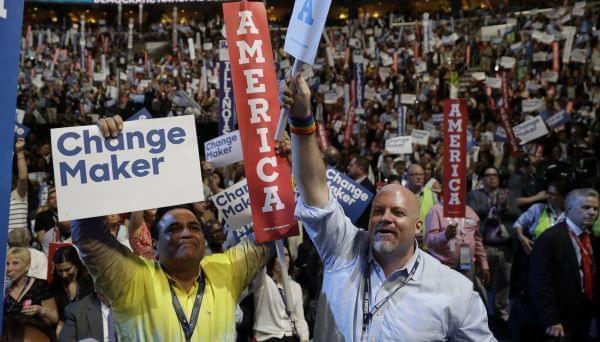Clinton Childhood Friend Part Of Historic Nomination; Sanders Supporters Walk Out

Illinois delegate Sunil Puri and supporter Jon Pyatt cheer during the second day session of the Democratic National Convention in Philadelphia, Tuesday. Matt Rourke / AP
For the first time … a major party has nominated a woman for President. With support from her home state of Illinois, Hillary Clinton officially became Democrats’ nominee Tuesday night at the party’s national convention in Philadelphia.
State delegations to the convention took turns casting their votes.
When it was Illinois' turn, party chairman Michael Madigan got things started by introducing the state with a nod to its Democratic heavyweights, like President Barack Obama. Then Madigan passed off the microphone to Bernie Sanders’ state director Clem Balanoff.
"Illinois proudly casts for a true progressive and the father of the new political revolution, 74 votes for Bernie Sanders," he said.
But it was Hillary Clinton who won Illinois’ primary, and a friend she’d grown up with in the suburbs of Chicago, Betsy Eberly, awarded those delegates.
“In honor of Dorothy and Hugh’s daughter and my sweet friend (I know you’re watching) this one’s for you, Hill. Ninety- eight votes. Yes.”
With that, it was Indiana’s turn. Hoosier delegates cast 43 votes for Sanders and 48 for Clinton, according to WLS-TV.
In the end, the final delegate tally gave Clinton 2,838 votes, leaving many Sanders delegates unhappy.
Regina McDonald, a Bernie Sanders delegate from Wheaton, walked out of the arena in protest of Clinton's nomination. “I feel that she’s part of the corruption, and I’m against corruption," McDonald said. "I’m against it. And Bernie should be the nominee. He should be the nominee. But it was stolen.”
Sanders state organizer Dan Johnson says the movement was able to get so far because of Sanders's appeal to independents.
"He attracts the people that are not going to vote the party ticket, they just will not," Johnson said Tuesday night. "And so I don't think that it's a sign of party disunity. It is rather a sign that Bernie's coalition was unique. Most presidential campaigns don't attract people that for decades reject The Party as a vehicle for implementing policies, as inherently flawed. And Bernie did."
Johnson says he'll spend the next 100 days trying to convince those voters to get on board with Clinton, but it's not a failure if all of them don't.

